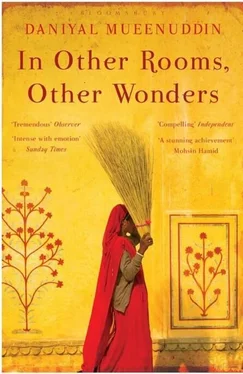‘For him I should have said, “I came with nothing, I leave with nothing. I leave with the clothes on my back. I served your father, when you were far away. The shame be on your heads.”’
But she could not afford even this gesture. The next day two men loaded the trunks onto a horse-drawn cart and carried them away to the Old City.
SOHAIL AND HELEN had begun dating two years earlier, at Yale, where she was an undergraduate and he at the law school. After graduating the previous summer he had returned to his home in Pakistan, while she completed her senior year. They had agreed to put the question of their future in abeyance until she finished school — not the question of whether they would be together but of how: in Pakistan, New York, or somewhere else. Sohail had vaguely committed himself to joining his father’s sprawling business — a sugar mill, farmlands, and much else. The degree had been a way to put off this step. He lived that fall in the family’s Karachi mansion, a rambling pile large enough that he could bear the rub of his parents, who occupied what was called the Old House, leaving him to an annex under an enormous banyan at the far end of the garden. When he announced to his mother that he would be going to Paris for Christmas, to meet Helen, she pursed her lips but said nothing. A few days later, he found her alone in the living room, having tea, waiting for guests. She had been a famous beauty, from a prominent, cultured Lucknow family. Now at forty-five she knew everyone of a certain class in Karachi, went to dinners and to the polo and to all the fashionable weddings, flew often to Lahore and Islamabad, and summered in London.
In winter, her rooms were warmed by a fire lit at dusk; in summer her rooms were kept ice cold. On her bad nights, as she called them, she took sleeping pills, which left dark shadows like bruises under her eyes. A portrait that hung in the formal dining room showed her reclining on a chaise longue, one shoe dangling from her long, elegant foot, skin velvety and evenly white; she seemed indolent and dangerous, as if she were waiting in ambush, with herself as the bait.
‘Hello, darling,’ she said. ‘Come have tea with me.’ She was sitting on a divan in a green silk sari with her feet tucked under her, her black hair pulled tightly back. ‘I don’t see you enough.’
He had been avoiding her, unable to abide her questions about his future — he was still ‘settling in,’ going every couple of days to the headquarters of the family business to write emails and read the New York Times online. During this time, with his confidence faltering, he found her overwhelming. He fixed on the cucumber sandwiches, devouring one after another.
‘Why won’t you ever use a plate? Your manners are even worse since you went to America.’ She took a plate, put a napkin under it, and gave it to him. ‘Sohail, I’d like to ask a favor.’ She blended these articulations together — following the maternal scolding, her request almost flirtatious.
He raised one eyebrow, nibbling at another sandwich.
‘I want your father to take a vacation, he’s pushing himself too hard. He’s always bored in London. I thought we might come to Paris.’ She said this brightly. ‘Only for a week, I know you’ll want to be alone. Do you remember when we were in Rome, how nice it was? Your father mentioned it just the other day, how much he’d liked that.’
‘I haven’t seen Helen since June,’ responded Sohail carefully. ‘Wouldn’t it be sort of like taking your mother on your honeymoon?’
‘Oh, we wouldn’t be in your way. And I’d like to see her. You’ll hardly know we’re there. I’ve found an apartment.’
He acquiesced, because he generally ended up doing as she wanted, and because he would inevitably and soon have to introduce Helen to his mother, in order to move the relationship forward.
Sohail had borrowed an apartment on Iªle Saint-Louis from one of his childhood friends, also a Pakistani industrialist’s son, who had spent much of the last several years in Paris being a writer — though not actually writing. Arriving in Paris two days before Helen, Sohail cleaned the apartment, made the bed with new sheets he bought at Galeries Lafayette, and picked up food and wine from the tiny overpriced shops on the Rue Saint-Louis-en-l’Iªle. After collecting Helen from the airport, Sohail carried her bag on his head up to the sixth-floor garret, hitting it on the turns of the narrow stairwell. She had come to love this in him, his playing, his willingness to be slightly ridiculous. At the top he dropped the suitcase, panting, and with a flourish produced a strange circular key, unlike those in America.
She paused at the door, a pretty girl, unmistakably American, her short hair held back with a tortoiseshell barrette. She had lived among and through books, in high school and then college, won a scholarship at Yale. Paris had been a dream from her childhood, when her single mother could not take her places, not to Europe. Walking across the room and opening the window, she looked out over a cloister, then across the Seine to the Panthéon and the city beyond. A phrase came to her mind — my barefoot need — another phrase from a book. She did not want Sohail to see this. It had begun raining again and the slate roofs opposite shed streams of water.
At dusk the following day, Sohail sat watching Helen dress for their first dinner with his parents. He wore a sports jacket, a black cashmere turtleneck, and pleated trousers; she rolled black stockings over her legs, which were pink and damp from the shower. Walking to the closet, naked but for the stockings, she removed a black dress, stepped into it, pulling it over the flare of her hips. She turned her back to him, and he zipped it, then stood for a moment holding her close, inhaling the scent of her hair.
They walked past the halfhearted Christmas tree in front of Notre Dame and then along the left bank of the Seine, among the headlights of scooters and cars, the crowds rushing home into the twilight, the tourists everywhere taking pictures, the Parisians with buttoned-down faces. The wet streets glittered. Helen walked beside Sohail, keeping up with him, her heels clicking. She drank in the city around them, moving so quickly, so differently.
A barge passed, going upstream, long and fast, smoking into the night, the lit cabin cozy and cheerful above the cold black water.
‘You know,’ she said thoughtfully, ‘the Seine doesn’t divide Paris, it keeps the city together. It’s just the right width, not a little stream but a public place in the heart of the city.’
Sohail leaned down and kissed her. ‘That’s a great image, the river not dividing Paris.’
‘It’s yours,’ said Helen. ‘For your next poem.’
His parents were staying in an apartment on the Quai des Grands Augustins, overlooking the Seine. Sohail and Helen went up to the second floor, found the door, and he had just touched the bell when a voice called, ‘Coming.’
‘Hello, darling,’ said his mother, presenting her cheek to kiss, looking past him to Helen. She had a husky, attractive voice and was dressed quite plainly, a long white cotton tunic embroidered in white over slim-fitting pants.
Helen extended her hand, palm flat, and looked Sohail’s mother in the eye, directly and ingenuously. ‘Hello, Mrs. Harouni. I’m Helen.’
‘And I’m Rafia. Welcome.’ She had fixed a stiff smile on her face.
Sohail’s father stood to one side, a smallish man with a little mustache, precisely dressed in a thick brown tweed suit with a vest and muted tie and brilliantly shined shoes of a distinctive tan color. As he took Helen’s coat he said, ‘Welcome, welcome. Thank you for coming.’ But his statement appeared to be reflexive, without connection to his mental processes. Putting the coat on a hanger, he looked at her closely, with shrewd eyes. Sohail had thrown his coat on a chair near the door.
Читать дальше












